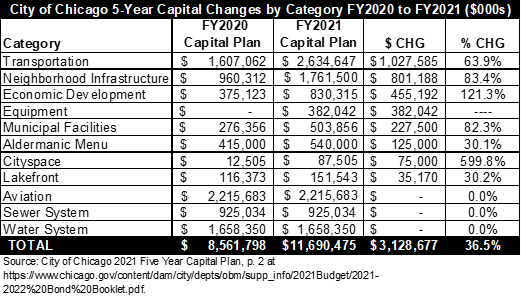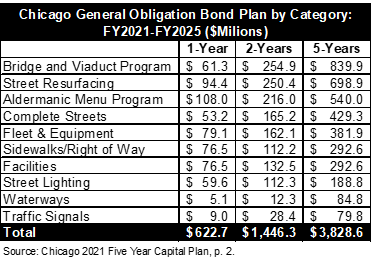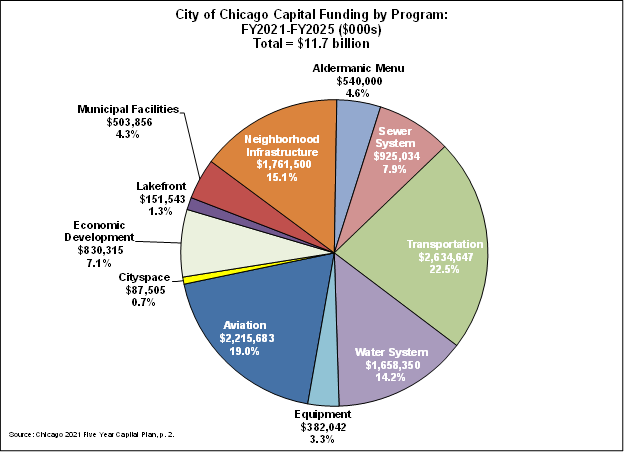November 24, 2020
On November 18, 2020, the City of Chicago released a multi-year capital plan for FY2021 through FY2025. The plan totals $11.7 billion over the 5-year period. This is a 36.5%, or $3.1 billion, increase from the previous FY2020 five-year capital plan of $8.6 billion.
The new capital plan provides a summary of projects to be primarily funded with general obligation bonds. It is not a full capital improvement plan (CIP) that provides comprehensive information about the planning, financing and expenditure of capital funds. The last CIP released by the City was the five-year FY2019-FY2023 plan. As such, the new five-year plan does not include detail regarding capital projects funded by other means such as tax increment financing, and federal and/or state funds nor does it include detailed information about water, sewer and aviation capital improvements funded by revenue bonds.
The exhibit below shows changes in funding by category between the previous five-year capital plan and the new one. The largest dollar increases are in the areas of transportation, which will see a $1.0 billion increase and neighborhood infrastructure with an $801.2 million increase. Neighborhood infrastructure projects include new street construction, street resurfacing, sidewalk construction and street lighting.

A total of $3.8 billion in General Obligation debt will be issued over the next five years to pay for capital projects. The exhibit below shows how much debt will be issued in one, two and five year periods by major project category. In the first year of the plan, approximately $622.7 million in bonds will be issued. By the second year of the plan, $1.4 billion in debt will have been issued.

Distribution of Five-Year Capital Funds by Program
The next exhibit shows the distribution of Chicago FY2021-FY2025 capital plan funds by program. Here are some of the highlights:
- The largest component of the capital program will be $2.6 billion for transportation projects, or 22.5% of all capital spending. These projects include bridge repairs and improvements, street improvements, intersection improvements, traffic signals and bus and rail improvements;
- Aviation projects will total roughly $2.2 billion, or 19.0%, of all funding;
- Neighborhood infrastructure projects such as lighting, new street construction, residential street resurfacing and sidewalk construction will consume $1.7 billion or 15.1% of all capital dollars; and
- Water system projects will use $1.7 billion or 14.2% of the capital plan funds.
The aldermanic menu program, which funds neighborhood improvements in each ward, will be increased substantially from $415.0 million to $540.0 million, a 30.1% increase. According to a published report, the amount of funding each alderman will receive in the capital plan will increase from $1.32 million to $1.8 million.
Smaller amounts will be provided for economic development, lakeshore revetment, projects that rebuild and strengthen lakefront retaining walls Calumet River dredging, municipal facilities, fleet and equipment and open space (the Cityspace program).

